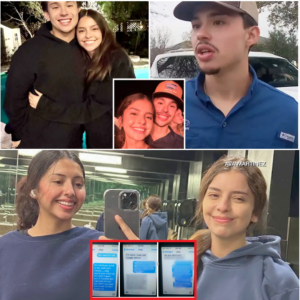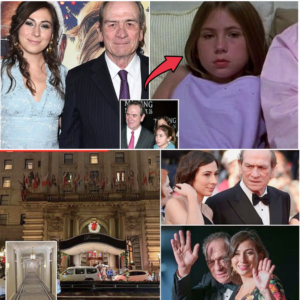In the dusty expanse of Holbrook, Arizona—a remote town in Navajo County where the high desert winds whisper through sagebrush and the shadows of nearby petrified forests stretch long over forgotten highways—the case of Rebekah Baptiste has ignited a firestorm of outrage and introspection. On September 8, 2025, Richard Daniel Baptiste, 32, and his girlfriend Anicia Woods, 29, stood shackled in Apache County Superior Court, their faces etched with the hollow defiance of the accused, as Judge Michael Latham read the litany of charges: first-degree murder, three counts of child abuse, and child molestation. The defendants, clad in striped jail uniforms that seemed to mock the casual attire of their daily lives, entered not guilty pleas in a hearing that lasted mere minutes but reverberated across the Navajo Nation and beyond. Rebekah, the 10-year-old daughter of Baptiste whose bright eyes and infectious laugh once lit up her third-grade classroom at Empower Academy Charter School in Holbrook, died on July 30, 2025, three days after being found unresponsive and brutally injured at the intersection of U.S. Highway 180 and Bushmaster Drive. What authorities describe as a “torture death”—marked by starvation, repeated beatings, and unimaginable cruelty—has exposed a harrowing chronicle of abuse that spanned years, ignored warnings from educators and relatives, and a glaring failure by Arizona’s Department of Child Safety (DCS) to intervene despite a decade of red flags. As the couple was led away, denied bond and remanded to the Apache County Adult Detention Center, Rebekah’s uncle, Damon Hawkins, stood outside the courthouse, his voice breaking amid a cluster of protesters holding signs reading “Justice for Rebekah – No More Silent Screams.” “She was a spark in the dark,” Hawkins said, clutching a faded photo of his niece in a sundress, her smile defiant against the desert sun. “They snuffed it out, and the system watched. This isn’t just their crime—it’s ours for letting it happen.”
The arraignment, a procedural pivot toward trial, unfolded under a sky heavy with monsoon clouds, the courtroom in St. Johns packed with family members, DCS investigators, and media from Phoenix to Flagstaff. Prosecutor Elena Vasquez, her tone measured but laced with steel, outlined the charges in a motion for joinder that binds Baptiste and Woods as co-defendants, arguing their “joint conduct” in Rebekah’s abuse and death demands unified accountability. First-degree murder carries a potential life sentence without parole, the child abuse counts—aggravated felonies—add decades, and the molestation charge, a class 2 felony, evokes the most visceral horror: allegations of sexual assault detailed in a sealed indictment that has left even hardened deputies shaken. Defense attorneys for Baptiste, public defender Marcus Hale, and Woods, appointed counsel Lisa Torres, mounted a vigorous not guilty plea, citing “insufficient evidence” and “procedural irregularities” in the investigation. Hale, in a post-hearing statement to reporters, hinted at mental health factors: “Richard is a father grappling with demons we all must understand before judgment.” Torres echoed, “Anicia’s role is misrepresented—coercion, not culpability.” Judge Latham, unmoved, set a preliminary hearing for October 20, 2025, and a trial date in early 2026, warning against “trial by media” as cameras flashed outside. The state’s request for no bond was granted, citing flight risk—Baptiste’s ties to Navajo tribal lands and Woods’ family in Phoenix—and the “heinous nature” of the crimes. As the gavel fell, Rebekah’s maternal grandmother, Karla Hawkins, 58, collapsed into her son’s arms, sobbing, “My baby girl’s gone, and they’re still breathing free air? How?”

Rebekah’s story, pieced from autopsy reports, school records, and DCS disclosures, is a tapestry of torment woven over years in a household that masqueraded as ordinary. Born on March 15, 2015, in Phoenix to Richard Baptiste and his then-wife, Maria Baptiste (née Hawkins), Rebekah entered the world amid the bustle of a city on the rise, her cries mingling with the hum of traffic on I-17. Richard, a 32-year-old Navajo Nation member with a history of odd jobs—from construction laborer to convenience store clerk—gained sole custody in 2019 after Maria’s parental rights were terminated amid substance abuse struggles, a decision DCS later scrutinized as “hasty.” By 2022, Baptiste relocated the family—Rebekah and her two younger brothers, ages 7 and 5—from urban Phoenix to a rundown trailer on the outskirts of Holbrook, a move he claimed was “back to roots” on ancestral land but prosecutors allege was isolation: no running water at times, spotty cell service, and a remote plot 20 miles from the nearest school. Anicia Woods, Baptiste’s girlfriend since 2021 and a 29-year-old cashier at a local Dollar General with a prior DCS involvement for neglect of her own child (removed in 2018), inserted herself into the fray, assuming a maternal role that twisted into tyranny. The couple’s dynamic, per sibling interviews, was a volatile brew: Baptiste’s explosive temper—fueled by unemployment stints and alleged methamphetamine use—clashing with Woods’ “discipline” regime, a euphemism for brutality that left the children in perpetual fear.
The abuse, chronicled in a 50-page Navajo County Sheriff’s Office report released August 15, 2025, was systematic and savage, escalating from neglect to outright sadism. Rebekah, described by teachers as “quiet but clever, with a knack for drawing horses,” bore the brunt—her small frame a canvas of bruises in varying stages of healing, from fresh welts to yellowed fades. Autopsy photos, entered as evidence, reveal a litany of horrors: ligature marks on wrists from being bound to a bedframe during “time-outs” that lasted days; cigarette burns on her thighs from “lessons in obedience”; missing toenails from Woods’ “foot punishments,” where the girl was forced to run barefoot on gravel until she collapsed. Starvation was weaponized: meals withheld for “talking back,” Rebekah subsisting on scraps pilfered from a neighbor’s trash, her 10-year-old body weighing just 62 pounds at death—30% below average. Sexual molestation allegations, substantiated by a forensic interview with her brothers, point to Woods’ “games” that left Rebekah withdrawn, wetting the bed anew after months dry. “She’d cry at night, whispering ‘Don’t let them find me,'” one sibling recounted through tears to a child advocate, their stories corroborated by school nurses who bandaged welts under long sleeves. DCS logs, spanning 2015-2025, tally 12 reports—eight for neglect, four for physical abuse—yet only one led to temporary removal in 2017, with reunification swift and unsubstantiated. Empower Academy, Rebekah’s school, flagged 12 concerns in 2024 alone: unexplained absences, bruises dismissed as “playground falls,” tardiness with matted hair and hunger pangs. “We called DCS every time,” Principal Elena Vargas testified in a preliminary motion. “They said ‘unsubstantiated’—now she’s gone.”
The final days were a crescendo of cruelty. On July 27, 2025, Rebekah—emaciated, disoriented from dehydration—fled the trailer at dawn, barefoot and in pajamas, staggering 1.2 miles to the highway intersection in a desperate bid for escape. Woods, roused by the missing girl, dialed 911 at 7:14 a.m., her voice a calculated quiver: “My stepdaughter ran away—she’s super scared of storms.” Bodycam footage, released September 2, captures the responders’ horror: Rebekah slumped against a guardrail, unresponsive but breathing shallowly, her body “black and blue from head to toe,” lips cracked from thirst, chunks of hair yanked out in bloody clumps. “She looks like she’s been through war,” Deputy Carla Ruiz radioed, her voice cracking as she cradled the girl, administering oxygen while Baptist and Woods arrived, feigning concern. “Neighbor found her like this,” Baptist lied, his hands trembling not from fear but fabrication. Airlifted to Winslow Indian Health Service Hospital, then transferred to Phoenix Children’s, Rebekah clung for three days—CT scans revealing a traumatic brain injury from blunt force, internal bleeding from ruptured organs, sepsis raging from untreated wounds. Monitors beeped futilely; her brothers, placed in foster care, drew pictures of “sister angel” at the bedside. On July 30, at 3:47 p.m., she slipped away, her final breath a whisper Hawkins family lore calls “free at last.”
The arraignment’s aftermath has galvanized a reckoning. Protesters—Navajo elders in traditional regalia alongside school staff in “Justice for Rebekah” tees—rallied outside the courthouse, chanting “No More Silent Children” as Hawkins addressed the crowd: “DCS failed her 12 times—my niece begged for help, and they looked away. This is systemic slaughter.” DCS Director Michael Miller, in a defensive August 20 presser, disclosed the reports’ timeline: a 2015 neglect call for “filthy home conditions”; 2017 abuse substantiation leading to removal; 2023-2024 flags for Woods’ “punishments” (belting, isolation) deemed “unsubstantiated” after family denials. “We’re reviewing internally,” Miller said, announcing a hotline overhaul and mandatory school liaisons. Critics, including the Arizona Center for Law in the Public Interest, decry it as “too little, post-mortem”: a class-action suit filed September 15 by Hawkins seeks $10 million for “negligent oversight,” citing DCS’s 2024 budget shortfall of $50 million that slashed caseworker ratios to 1:60. Empower Academy’s Vargas, in a tearful op-ed for the Arizona Republic, lambasted: “We screamed; they shrugged. Rebekah’s desk is empty—whose next?”
Baptiste and Woods, isolated in separate cells—Baptiste in solitary for “aggression,” Woods under suicide watch—face a trial that could span 2026, prosecutors eyeing the death penalty despite Arizona’s moratorium since 2022. Siblings, now with Hawkins, undergo therapy at a Flagstaff trauma center, their drawings of “happy Rebekah flying” a fragile bridge to healing. Brittni Page? Wait, no—in this saga, it’s Hawkins’ kin, the boys’ whispers of “she’s safe now” a balm against nightmares. A GoFundMe for Rebekah’s memorial—petrified wood benches at a Holbrook park—tops $200,000, donors from Gallup to Gallup echoing: “For the girl who ran to the light.” As autumn winds scour the highways, Rebekah Baptiste’s ghost guards the intersections—a sentinel against silence, a cry for children unseen. In Apache County’s vast quiet, her arraignment marks not closure, but combustion: justice’s slow burn for a spark extinguished too soon.

